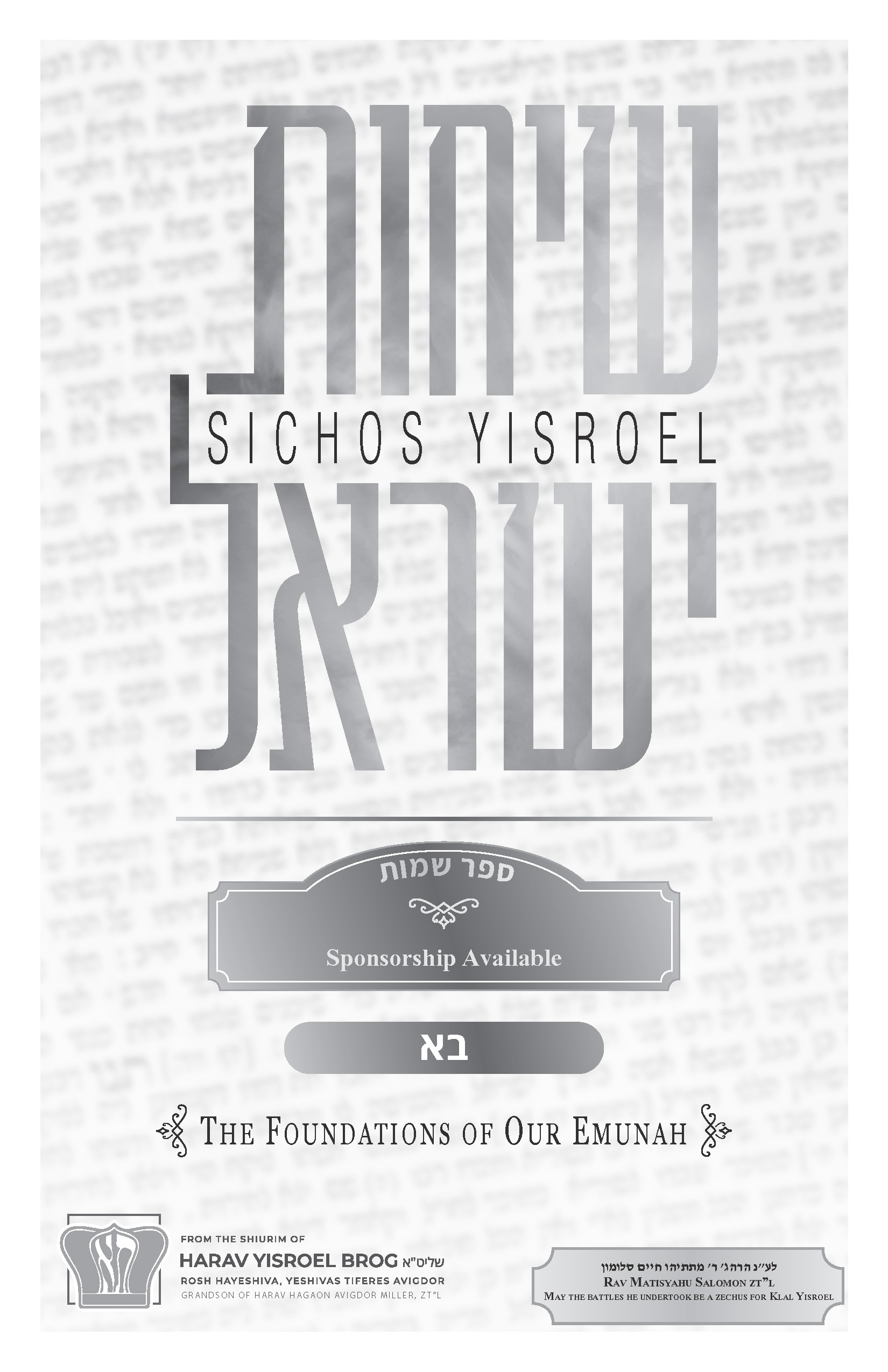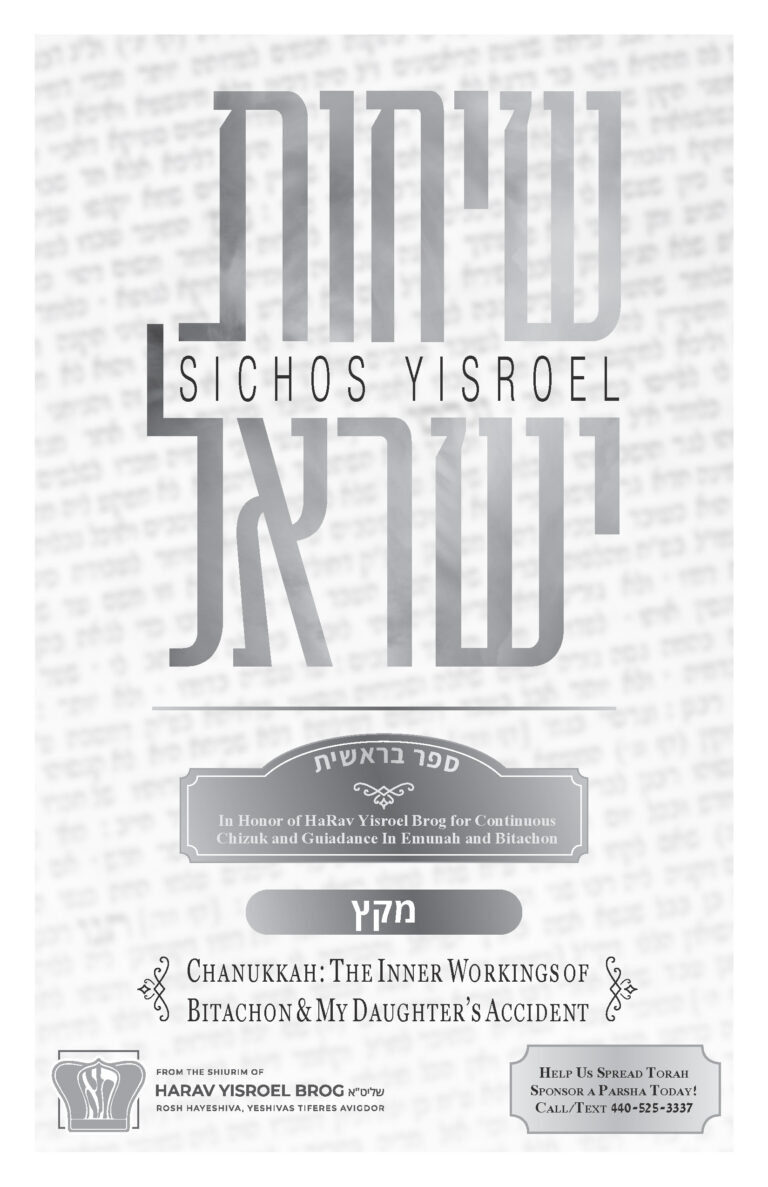Bo 5784: The Foundations of Our Emunah
Sponsored in memory of
לע”נ הרהג’ ר’ מתתיהו חיים סלומון
Rav Matisyahu Salomon zt”l
May the battles he undertook be a zechus for Klal
Consider sponsoring a shiur
Visit YTATorah.org
Shiur presented in 5779
At the end of Parshas Bo, there’s a very, very important and fundamental Ramban that describes how the principle beliefs of our emunah were revealed at the time of Yetzias Mitzrayim. Every single Yid must know what are the yesodos of our emunah. The term we as a yeshiva developed to remember what we believe in is: ח.י.ה.
I told you the story of how a fellow once called the Telz Yeshivah office. It was Friday afternoon. The rav answered the phone. The fellow on the other end of the line is whispering. He says, “Is this a rabbi?” He says, “Yes.” He says, “Rabbi, what do we believe? What is it that Jews believe?” He said he was in a business meeting, about to close a deal, and this non-Jewish fellow he’s with is religious, and he just told him what he believes, and he turned to the Jew and asked the Jewish fellow, “So what is your basic belief?” and he didn’t know what to answer. So he stepped out for a moment, went to the phone, and called the Telz Rabbinical College. The rav said, “Call this number.” He had him call me. The rav called me quickly, saying, “Somebody’s calling you. Answer the phone, please.” The fellow asked me, “What is it that we believe?” I said, “I’m going to give it to you in three short statements.”[i]
חידוש – Koach Hachiddush
It’s scary because a lot of people don’t really know what we believe. The first major principle of our emuna is that Hashem was mechadesh the world. Hashem introduced the world to itself from nothing, yesh mei’ayin. That’s number one. You have to remind yourself of this.
Now, this koach hachiddush is only part A of the koach hachiddush. Do you know what part B of the koach hachiddush is? So Part A is, Hashem brought this world into existence ex nihilo, from nothing. Part B is that Hashem continuously renews the world every single second. המחדש בטובו בכל יום תמיד מעשה בראשית. Chiddush part A, chiddush part B. You have to sear that into your heart. In everything you look at, you should see Hashem’s creation. Right now, Hashem is creating, and He recreates, and He recreates. That is the first major principle of our faith.
יכולת – Yecholes
The second principle of faith that was demonstrated in Mitzrayim is Hashem’s yecholes. That means Hashem’s ability to do with the world whatever He desires at any single moment, and nobody or nothing in the world could prevent Him from doing as He wills. Yecholes.
השגחה – Hashgachah
The third principle is hashgachah, supervision. The fact that Hashem pays attention to everything in this world and specifically to the min adam, the human species.
Now, most people don’t like mashgichim. That’s why they try to remove from themselves this belief. Many people believe that if Hashem wants, He could get involved. He could, so to speak, go back and look at the video. Go check the computer screen if He wants to. To be mashgiach over every single person and every single thing, they’d say it’s impossible.
The first letters of Chiddush, Yecholes and Hashgachah form an acronym – that’s what we call חיה. Now, when I call you (speaking to his talmidim) a “chayah,” from now on, understand I’m reminding you of the principles of faith. Remember that. Chiddush, yecholes and hashgachah. I want you to review this. I want you to know this. If you don’t, you don’t know what a Jew believes. You’re clueless. You have no shaychus to emunah and Klal Yisrael.
Mitzvos That Help Us Remember Emunah
The Ramban says (ibid.) that people could forget this. It’s not a hard thing to forget. Many people don’t know this. Many people knew it, and forgot it. They don’t believe it now. That’s the reason, he says, why there are so many mitzvos associated with Yetzias Mitzrayim. There is a big boatload of mitzvos that are זכר ליציאת מצרים. Why is it like that? Because Hakadosh Baruch Hu wants להיות לנו עדות לכל הדורות, that we should have a testimony throughout the generations. במופתים, in those miracles, שלא ישכחו, we should not forget them, ולא יהיה פתחון פה לכופר להכחיש אמונת האלקים, so that a kofer or fool should not open his mouth and deny emunah in Hashem.
Now, every time you think of this, rabbosai, you’re getting a mitzvah de’Oraissa! Instead of sitting there and wondering, “What in the world should I be thinking about?” No, don’t think about fun, and foolish matters. What you should think about is chayah, chayah, chayah. You look at a mezuzah. What do you see in the mezuzah? Nothing. Do you know what you’re supposed to see? זכר ליציאת מצרים. You know what it says in that mezuzah? It describes the emunah in Hashem. Get that into your kishkes. I’m telling you, this is a tremendous piece of advice. This is how you relate to your neshamah. This is how you relate to Yiddishkeit. This is how you relate to Hashem.
Do you know that every time a person says, “Hashem, I believe in the fact that You are mechadesh, the fact that You are Kol Yachol, that fact thatYou are mashgiach,” — for every second a person says that, he is mekayem a mitzvah de’Oraissa! This is one of the sheish mitzvos temidiyos, six constant commandments, if not more than one of the sheish mitzvos temidiyos.This is extremely fundamental. I’m always surprised how people sometimes forget it from year to year, so I have to remind them.
Hashem Tells Us Why He Made The World
The Ramban (ibid.) says that there is another tremendous lesson that Hashem conveyed to us through His open miracles. He says there is a famous question as to why and for what purpose Hashem created the whole world. What was the purpose of it all? Now, you know a human being could possibly think, “Is it really my business to ask why Hashem created the world?” Is that a valid question? Who are we to even ask such a question? It’s not my business why Hashem created the world. I’ve got to do what Hashem said. But as for why He wants me to do what He said, I would think we should apply the famous Brisker principle, “Az mir fregt nisht farvus. Fregt vus, You don’task why. You ask what.”
However, you have to know that the rishonim and the achronim dealt with this question. The Ramchal, a giant, in his sefer Derech Eitz Chaim,relates to this question. He says one of the first questions you have to ask yourself is, what was Hashem’s purpose that He created the world for? This amazing briah hagedolah hazos! He says, don’t say, “Who am I? Who is man to even second guess Hashem and try to figure out His kavanah.” The passuk says, מאד עמקו מחשבותיך, “Hashem’s thoughts are very deep.” So, someone might think it’s arrogant to say that you can find a reason why Hashem created the world. But Ramchal strongly rejects that ta’anah,and says that the responsibility of a person is to be aware and to know why Hashem created the world, as it says in the passuk סוד ה’ ליראיו ובריתו להודיעם.[ii]
Now the question is, what is the reason that Hashem created the world? Do you know the reason Hashem created the world? What did Hashem create this complex world for?
Participant: Nisyonos.
That’s definitely part of the world. But the reason why He created the world wasn’t for nisyonos. The existence of the world, the way you get to your final destination, is through nisyonos.
So why did Hashem create the world?
Being “Modeh” That He Created Us
The Ramban (ibid.) says: שאין לנו טעם אחר ליצירה הראשונה, we have no other reason in the first creation of the world, ואין א-ל עליון חפץ בתחתונים, Hashem has no desire in this world, in the individuals and people in this world, מלבד, besides, שידע האדם, that a person should know, ויודה לאלקיו שבראו. You hear that? Hakadosh Baruch Hu wants us to acknowledge, number one, that He created us. We should be modeh to that fact. We say this in Modim every day: נודה לך, we are modeh to You, ונספר תהילתך על חיינו המסורים בידך, and we will relate Your praises.
The Ramban says such an amazing thing; there’s no other reason for the creation of the worldbesides for the fact that people should acknowledge they were created by Hashem and express that! נודה לך ונספר תהילתך על חיינו המסורים בידך.
The Point Of Being Modeh Is to Serve Hashem
Now, I want to give you a little insight regarding this point. When the Ramban says that we have to have an emunah that He’s the Borei and we have to express to Him that He created us, do you know what that inyan is? That’s what the passuk says כל הנקרא בשמי, “anything that’s called by My name,” ולכבודי בראתיו, “whom I have created for My Honor” (Isaiah 43:7). We’re modeh to Hashem and we serve Hashem.
Now, when is the last time you thanked Hashem that you’re alive or that you exist? Are you happy that you exist? Yes! Of course! So now you understand that there’s nothing that’s mechayev hoda’ah, there’s nothing that obligates a person to acknowledge Hashem more than that.
You know, people complain a lot of times about their lives. I tell them, “It’s a false complaint, because if right now you discovered that you have an illness that you may possibly lose your life or even if you discover you’re going to experience yesurim, which will diminished your quality of life, or you may lose your parnasah, or you found out that you are in sakanas nefashos mamash – if you found that out, you would lose your mind. And then, if you would be spared from that and saved, you would definitely have a very strong debt of gratitude to the one who saved you. So we are obligated to acknowledge Hashem and thank Him, for the actual life itself that we have that is gifted to us from the Borei Olam beretzono, and for the fact that He put us in this world mei’ayin leyesh and continuously maintains our life.”
Rav Yisrael Salanter writes, a person would spend everything he has to extend his life. I remember thinking about that. Imagine you go to a rich guy and you ask him, “How much would you pay for an extra day of life?” If the guy wasn’t in immense pain, if the guy wasn’t suffering, and the doctor tells him, “Today is your last day on this earth,” he would turn to the doctor and say, “Doctor, is there any way in the world my life can be extended for any amount of money?” How much would a person pay for an extension? It’s amazing.
But a person finds himself in this world existing constantly and never being grateful about it! People are unhappy about it. They’re not modeh to Hashem. Most people, when they say מודים אנחנו לך you know what they think? What am I thankful for? What do I have so great that I could be thankful for? You look at the other guy, and you say, “He’s taller than me.” You look at the next guy on the other side, “He’s stronger than me.” You look at the guy in front of them, “He’s got nicer clothes than me. And the guy behind them is richer than me. What do I have to be thankful for?!” People don’t begin to know and acknowledge that their very existence is something that is mechayev them to thank and serve Hashem.
Joy For The Simple Gift Of Existence
I want to share with you some words of Rav Saadya Gaon.[iii] Hakadosh Baruch Hu is a tov umeitiv like it says in the passuk טוב ה’ לכל ורחמיו על כל מעשיו, “Hashem is good to all, and His mercy is upon all His works” (Tehillim 145:9). And then Rav Saadya Gaon says: והגדול שבחסדיו, what’s the greatest chessed that Hashem confers on His creations? Do you know what the greatest chessed is? He says, שנתן להם את ההוויה, He gives them existence. כלומר, that means to say, מה שהמציא אותם, the fact that He gives them life, אחר שלא היו. The matnas chaim, the gift of life itself.
Now, that thought is supposed to give a person a gevaldig sense of simchah. When it says עבדו את ה’ בשמחה, a person should walk around feeling happy, feeling grateful. And if a person then thinks to himself, “Hashem, I messed up numerous times. I did a lot of not-nice things, and I didn’t live up to Your will, but You continuously kept me going.” We probably wouldn’t keep somebody going if they behaved like we do, right? A person has to know this. You don’t even feel it anymore. Baruch Hashem, I was zocheh to have a zeida (Rav Avigdor Miller), so it’s mechayev me. My zeida lived his life like that.
The Water Test
Let’s say you have a person who lives in a place that’s full of smog. He lives in this place. The tendency of people is to do what? They complain. They don’t move. People get used to their lives. They stay there. That’s why the Chinese are all staying in China. People are staying in LA. You know why? Because that’s the life they’re used to living. They have no other life without it. But people tend to complain. A person has to realize whatever air you’re breathing, if it’s keeping you alive, you owe Hashem everything!
I once had a story when we used to live in the same house as my grandfather. He lived upstairs, and we lived downstairs. I was a young boy, and I went upstairs to see if my bubbie was home. I never used to intermingle, interact with my grandfather. He was in his room learning. He was always on a higher plane. There were special occasions for that. We had a seder once a week after havdalah, my older brother and I would go upstairs and spend some quality minutes with him. But on an ordinary occasion, we didn’t bump into each other too much.
I went upstairs, and I said, “Bubbie, Bubbie, Bubbie.” No one answers. I walked into the kitchen, and I saw my grandfather with his head buried in the kitchen sink. I went over to see if he fainted in the sink, and I saw the sink was full of water! My heart gave a little flutter. “What is he trying to do, drown himself in the sink?!” All of a sudden, he came rushing out of the sink, with his head out and he started to say in Yiddish, “How delicious is this air. How wonderful is this air.” I said, “Zeide, are you all right?!” I thought he lost his mind. What’s going on here?!
He had put his head in the sink until his lungs were ready to burst. He explained to me what happened. He said, “I just came from a walk outside.” It was in the summer. A fellow met him and told him how terrible the smog is in New York in the summer. The pollution and contaminants in the air, and my zeida said, “I felt he was right. It’sdirty air. Then I walked away from him and I felt terrible. I thought to myself how ungrateful can you be? This dirty filthy contaminated air keeps you alive every second of the day. This is how you treat Hashem?!”
So what did he do? He decided to fill a sink up with water, put his head in the water for as long as he can and he’d take his head out of the water and then he would realize that he has what to be grateful for. This was a tikun. A tikun for what? For feeling ungrateful for a few moments!
Acknowledgement Of Hashem For Our Existence
Now this is frightening, because if you’ll ask people, “When was the last time you thanked Hashem for your existence, or for your general health, or for not not having cancer, as an example?” Just yesterday I learned that a third person from the same group of people I learned with in Lakewood, a rosh yeshivah, left this world at the age of 60. It gave me a shukel. I know of people that are relatively young, in their 60s, whom Hashem took out of this world. When I heard about that, it scared me. It gave me a real scare. I thought about that. Just today I heard a story about a young boy from Florida. He lived on the ninth floor, Collins Avenue. He came home last night and he couldn’t get into his house. He didn’t have a key. So he went to the neighbor one floor above him, the tenth floor, and he asked the neighbor if he could climb down from the neighbor’s porch to his porch. The neighbor said, “Go ahead.” He started to climb down and he lost his footing and this 16-year-old boy left the world. When I read that, it gave me a shudder. I remember many times in my life climbing down from precarious places. We all did stupid things.
Where we grew up, they used to have in the parks what were called monkey bars. But in those days all the floors were pure cement. I fell a lot of times. Hashem saved my life. You never think about it. You know how grateful I am for that?
There was also a young rosh yeshivah, who was niftar last week. Another young person who left the world. And a month ago, my brother-in-law was niftar. It’s unbelievable! One little city. Hashem is waking people up.
You have to be thankful to Hakadosh Baruch Hu from the bottom of your heart that you exist. And you have to express that. You first have to acknowledge Him. “Hashem, I know it’s You.” That’s what you have to say first.
Hakadosh Baruch Hu wants us to acknowledge that, and whenever you do a mitzvah that’s what you say.
Why Gather Together In Shuls
Next the Ramban (ibid.) adds a tremendous chiddush. Listen to what he says. What’s the whole purpose of batei kenessiyos? What’s the whole concept of shuls? What’s so important about a shul? You know what he says? The whole purpose of a shul is for people to come and gather, ויודו לא-ל שבראם והמציאם, and be modeh that Hashem created them and continues to bring them into the world. If you don’t show up in the shul, you know what you’re saying to Hashem? “I’m not going to participate in this exercise. I’m not joining the club.”
You’ll notice an interesting thing if you pay close attention. I took notice of this when I was a bachur. When individuals don’t come to davening, you will find that after not a long time, they experience suffering or challenges. Many of them. People who are challenged. They even forgot that they were challenged to come to davening. They don’t understand. Hashem is telling them, “If you will not come together with the Bnei Yisrael to accomplish the purpose for which I put you in this world for – to get up and say, ‘Hashem You created me’ (and I created a specific place for getting together to say this) – you will have to pay a price. I will send you a reminder and you have to lose some of the privileges that you had.”
Loud Davening Vs. The Silent Treatment
I’m still trying to find out if the same thing applies to people who don’t express it out loud. I’m studying it. It’s more subtle, so I can’t tell. Because the Ramban says that the purpose of davening in a shul is רוממות הקול. He says the whole idea of davening loudly is because you want to express out loud, “This is what I believe, Hashem.” A person who gives Hashem the silent treatment is not behaving properly. When you look at a lot of people when they are davening, do you know what they look like? Many look like they’re angry at Hashem. Compare it to when your mother said, “Read the paragraph.” “Uh bu bu.” You start getting in one of your moods. That’s how many people daven to Hashem. They never open their lips. The Ramban says: וכוונת רוממות הקול בתפילות – you’ve got to say it out loud.
When I tell you to bentch out loud, and you give me some bubba ma’aseh why you’re not bentching out loud, Rabosai, you’re undercutting your lives, and I mean that. It’s for your benefit to lift your voice and say ברוך אתה ה’ אלקנו מלך העולם הזן את העולם כלו בטובו. You come and say, “Oh, I’m Sefardi. I’m Ashkenazi. I’m from this. I’m from that. It’s not my minchag. I don’t daven this nusach.”You don’t daven out loud, my friend? You’re throwing Hashem under the bus! Hashem says, “I gave you a mouth. I want you to raise your voice, and I want you to say it out loud.” When the chazzan says: ברכו את ה’ המבורך, you see guys going, “Mbmbmbm.” They come up and give Hashem the silent treatment. They don’t say anything out loud. No רוממות הקול. The Ramban says, Hashem says, “I gave you this place, a shul, מקום שיתקבצו בני אדם ויודו לא-ל שבראם והמציאם.”
Look at people who are challenged in how they serve Hashem. These people are looking for tzaros. They’re asking Hashem for tzaros. I don’t say it’s major tzaros, and I hope they don’t get major tzaros, but Hashem starts with giving them some minor tzaros. Maybe it’s tzaros of having headaches. Maybe they have stomach aches. Maybe they have other issues, anxieties. Maybe they have issues with sleep, which makes it hard, and they can’t wake up. They have all kinds of issues. Maybe they have financial issues. Hashem says, “Rabosai, I gave you an opportunity!”
Do you think that if a person is going to perform what he came to this world to perform, Hashem is not going to give him more life and more good so he can perform better?! Of course He’s going to do that! There’s no question! That’s the reason why Hashem brought you into the world. You look at others who don’t do that, they don’t raise their voices – look what happened to them. Hashem wants a person to say the tefillos out loud. He wants you to acknowledge that He created you. If you do that, you’ll be in good shape. Hashem is going to give you more of the good stuff. He’ll give you more of life. Be mischazek to improve in this every time you hear about something that happened to somebody, it’s unbelievable. A person has to realize that Hashem is sending us a message.
The Importance of Coming To Shul On Time
Hakadosh Baruch Hu should help us be mischazek in this prat and strengthen ourselves. When you think you should come to the shul and your yetzer hara tells you, “Nah, don’t go to shul.” And you’re thinking to yourself, “Why should I go to shul? Why should I go? What’s the purpose? Does it make a difference if I come ten minutes late? Twenty minutes late?” It does. My grandfather used to say, “If you’re not early in shul, you have no yiras shamayim.”It’s a very scary thought, rabbosai.
My father was a very early man. I remember one Friday afternoon, my father came to shul in the middle of Ashrei. Everybody knows that Friday afternoon minchah,everybody comes late. It’s like a standard thing – because everybody is busy with Shabbos. A lot of people are late. My grandfather and my father used to sit on the same bench. In the middle of Ashrei, my grandfather gave him some mussar. A lot of people weren’t in the shul; I looked around. There were very few people there. He raised his voice when singing the words להודיע לבני האדם…He said it like this. My father was very meticulous. But my zeida thought my father could accept this. You come to shul in the right way, as required. You look forward to going to shul to be modeh to Hashem that He created you. Hakadosh Baruch Hu should help us to succeed in these important points and give nachas and acknowledgement to Hashem.
The Bottom Line
The first principle of our emunah is that Hashem was mechadesh the world yesh mei’ayin. We have to be aware of this idea and constantly remind ourselves of it. Part B of this first principle is that Hashem renews the world every single moment, המחדש בטובו בכל יום תמיד מעשה בראשית. The second principle of our emunah, is Hashem’s absolute ability to do what He wants in the world, at any given moment in time, without anyone or anything preventing Him. The third principle is Hashem’s hashgacha, and most detailed supervision of the human race, and especially Klal Yisrael. As we learned from the Ramban, remembering the events of Yetzias Mitzrayim, where these great principles of our emunah originated from, allows us to fulfill a Torah commandment of emunah, which is one of the six constant mitzvos. We also learned from the Ramban that Hashem’s one singular purpose behind creating the world and giving us mitzvos is for people to acknowledge that He is their Creator. This realization should be the catalyst to fuel our hakoras hatov for the most precious gift and the biggest chessed there is – life itself, which Hashem has gifted us with and continues to maintain on a daily basis as a matnas chinam. So my own existence, therefore, is mechayev me to thank Hashem and serve Him, and acknowledge Hashem’s greatest chessed every time I step into a shul to daven b’tzibur or do any mitzvah for that matter. This coming week, I will “raise my voice” in tefillah and in bentching, at least in the first bracha, to remind myself and acknowledge Hashem’s chessed in giving me my life and say to Him, “I know that the life itself and everything I have is only from You, Hakadosh Boruch Hu.” And in the zechus of learning to adopt this mindset, I will elevate my Avodah and will see Hashem giving me more good things, life, and brachah from Above.
[i]ועתה אומר לך כלל בטעם מצות רבות הנה מעת היות ע”ג בעולם מימי אנוש החלו הדעות להשתבש באמונה, מהם כופרים בעיקר ואומרים כי העולם קדמון, כחשו בה’ ויאמרו לא הוא (ירמ’ ה יב), ומהם מכחישים בידיעתו הפרטית ואמרו איכה ידע אל ויש דעה בעליון (תהלים עג יא), ומהם שיודו בידיעה ומכחישים בהשגחה ויעשו אדם כדגי הים שלא ישגיח האל בהם ואין עמהם עונש או שכר, יאמרו עזב ה’ את הארץ. וכאשר ירצה האלהים בעדה או ביחיד ויעשה עמהם מופת בשנוי מנהגו של עולם וטבעו, יתברר לכל בטול הדעות האלה כלם, כי המופת הנפלא מורה שיש לעולם אלוה מחדשו, ויודע ומשגיח ויכול. וכאשר יהיה המופת ההוא נגזר תחלה מפי נביא יתברר ממנו עוד אמתת הנבואה, כי ידבר האלהים את האדם ויגלה סודו אל עבדיו הנביאים, ותתקיים עם זה התורה כלה: ולכן יאמר הכתוב במופתים למען תדע כי אני ה’ בקרב הארץ (שמות ח׳:י״ח), להורות על ההשגחה, כי לא עזב אותה למקרים כדעתם ואמר (שם ט כט) למען תדע כי לה’ הארץ, להורות על החידוש, כי הם שלו שבראם מאין ואמר (שם ט יד) בעבור תדע כי אין כמוני בכל הארץ. להורות על היכולת, שהוא שליט בכל, אין מעכב בידו, כי בכל זה היו המצריים מכחישים או מסתפקים. אם כן האותות והמופתים הגדולים עדים נאמנים באמונת הבורא ובתורה כלה: ובעבור כי הקב”ה לא יעשה אות ומופת בכל דור לעיני כל רשע או כופר, יצוה אותנו שנעשה תמיד זכרון ואות לאשר ראו עינינו, ונעתיק הדבר אל בנינו, ובניהם לבניהם, ובניהם לדור אחרון והחמיר מאד בענין הזה כמו שחייב כרת באכילת חמץ (שמות י״ב:ט״ו) ובעזיבת הפסח (במדבר ט יג), והצריך שנכתוב כל מה שנראה אלינו באותות ובמופתים על ידינו ועל בין עינינו, ולכתוב אותו עוד על פתחי הבתים במזוזות, ושנזכיר זה בפינו בבקר ובערב, כמו שאמרו (ברכות כא.) אמת ויציב דאורייתא, ממה שכתוב (דברים טז ג) למען תזכור את יום צאתך מארץ מצרים כל ימי חייך, ושנעשה סכה בכל שנה: וכן כל כיוצא בהן מצות רבות זכר ליציאת מצרים והכל להיות לנו בכל הדורות עדות במופתים שלא ישתכחו, ולא יהיה פתחון פה לכופר להכחיש אמונת האלהים. כי הקונה מזוזה בזוז אחד וקבעה בפתחו ונתכוון בענינה כבר הודה בחדוש העולם ובידיעת הבורא והשגחתו, וגם בנבואה, והאמין בכל פנות התורה, מלבד שהודה שחסד הבורא גדול מאד על עושי רצונו, שהוציאנו מאותו עבדות לחירות וכבוד גדול לזכות אבותיהם החפצים ביראת שמו: ולפיכך אמרו (אבות פ”ב מ”א) הוי זהיר במצוה קלה כבחמורה שכולן חמודות וחביבות מאד, שבכל שעה אדם מודה בהן לאלהיו: וכוונת כל המצות שנאמין באלהינו ונודה אליו שהוא בראנו, והיא כוונת היצירה, שאין לנו טעם אחר ביצירה הראשונה, ואין אל עליון חפץ בתחתונים מלבד שידע האדם ויודה לאלהיו שבראו, וכוונת רוממות הקול בתפלות וכוונת בתי הכנסיות וזכות תפלת הרבים, זהו שיהיה לבני אדם מקום יתקבצו ויודו לאל שבראם והמציאם ויפרסמו זה ויאמרו לפניו בריותיך אנחנו, וזו כוונתם במה שאמרו ז”ל (ירושלמי תענית פ”ב ה”א) ויקראו אל אלהים בחזקה (יונה ג ח), מכאן אתה למד שתפלה צריכה קול, חציפא נצח לבישה (עי’ ערוך ערך חצף): ומן הנסים הגדולים המפורסמים אדם מודה בנסים הנסתרים שהם יסוד התורה כלה, שאין לאדם חלק בתורת משה רבינו עד שנאמין בכל דברינו ומקרינו שכלם נסים אין בהם טבע ומנהגו של עולם, בין ברבים בין ביחיד, אלא אם יעשה המצות יצליחנו שכרו, ואם יעבור עליהם יכריתנו ענשו, הכל בגזרת עליון כאשר הזכרתי כבר (בראשית יז א, ולעיל ו ב) ויתפרסמו הנסים הנסתרים בענין הרבים כאשר יבא ביעודי התורה בענין הברכות והקללות, כמו שאמר הכתוב (דברים כט כג-כד) ואמרו כל הגוים על מה עשה ה’ ככה לארץ הזאת, ואמרו על אשר עזבו את ברית ה’ אלהי אבותם, שיתפרסם הדבר לכל האומות שהוא מאת ה’ בעונשם. ואמר בקיום וראו כל עמי הארץ כי שם ה’ נקרא עליך ויראו ממך. ועוד אפרש זה בעזרת השם (ויקרא כו יא) [רמב”ן על שמות י״ג:ט״ז:א]
[ii] הנה החקירה הראשונה אשר תחקור הלא היא על כוונתו יתברך שמו על מה ולמה ברא את כל הבריאה הגדולה הזאת, ואל תאמר: ומה האדם שיבוא אחרי המלך לבקש את מחשבתו, והמקרא מעיד [תהלים צ”ב, ו’] “מאד עמקו מחשבותיך”, וזה נראה כגאוה וכגודל לבב לאמר שיוכל למצוא כוונת המאציל יתברך שמו, אדרבה, על זה נאמר [תהלים כ”ה, י”ד] “סוד ה’ ליראיו ובריתו להודיעם” , והוא הסוד הכולל כל ענין המעשים אשר עשה ואשר הוא עושה (סז), ושאחריו נמשכים כל חוקות הבריאה כאשר שם לשמים ולארץ וכל תולדותיהם, כי הלא לכל המעשים הרבים והגדולים האלה יימצא סוף ותכלית אחד, וזה הוא הסוד המוזכר כאן בפסוק, והחוקים אשר הושמו על פי הכוונה הזאת כללותם הוא הברית אשר הזכיר “ובריתו להודיעם”, הוא הברית אשר שם לכל נברא לעמוד על מתכונתו ולא יסור, והוא הנרמז במלת “בראשית” “ברית אש”, כמו שפירשוהו בתיקונים תיקון העשרים ושמונה.
[iii] כתב רס”ג באוייד תחילת מאמר גי: “מה שראוי להקדים פתיחה למאמר זה, שהבורא יתרומם ויתהדר כיון שנתברר שהוא קדמון שלא היה עמו מאומה, היתה אם כן יצירתו את העולם טובה מאתו וחסד, וכפי שהזכרנו בסוף המאמר הראשון בסבת בריאת כל הדברים, וממה שנמצא גם בכתובים שהוא טוב ומטיב, כמו שאמר הכתוב טוב ה’ לכל ורחמיו על כל מעשיוי, והגדול שבחסדיו על בריותיו הוא שנתן להם את ההויה, כלומר מה שהמציא אותם אחר שלא היו, וכפי שאמר לנבחריהם כל הנקרא בשמי ולכבודי בראתיו. ואחר כך נתן להם סבה שבה יגיעו אל האושר המושלם ואל הטובה השלמה, כמו שאמר תודיעני אורח חיים שבע שמחות את פניך נעמות בימינך נצחי, והוא מה שצוום בו והזהירם עליו. ודבר זה, הנה ראשית מחשבתי השכל יתבונן בו ויאמר, והרי היה יכול להטיב להם הטובה השלמה ויתן להם האושר הנצחי מבלי שיצוום ולא יזהירם, ואף נראה שיהא חסדו בכך יותר טוב להם במה שפורק מעליהם מן העולי ?, ואומר אני בבאור ענין זה, אדרבה מה שעשה סבת הגעתם אל הטובה הנצחית השמעותם למה שצוום בו הוא יותר חשוב, לפי שהשכל מחייב שכל מי שהשיג טוב על מעשה שעשה מגיע לו כפלים ממה שמגיע מן הטוב למי שלא עשה כלום אלא שנתנו לו בחסד, ואין השכל מחייב להשוות ביניהם, וכיון שהדבר כך הכריע עלינו בוראינו אל החלק היותר חשוב, כדי שתהא תועלתינו בגמול כפלי תועלת מי שלא עשה, וכמו שאמר הנה ה’ אלהים בחזק יבוא וזרעו משלה לו הנה שכרו אתו ופעלתו לפניו.”






